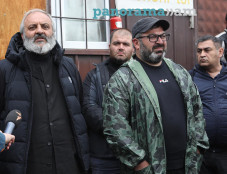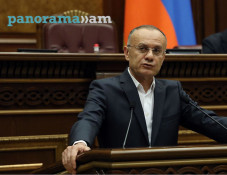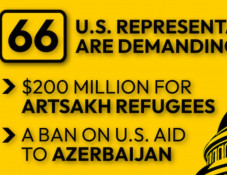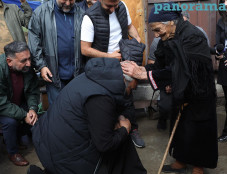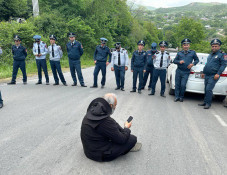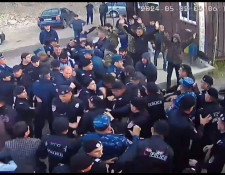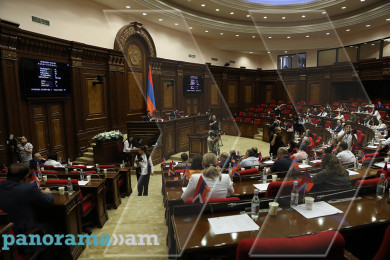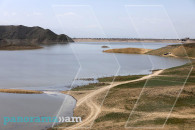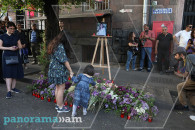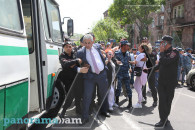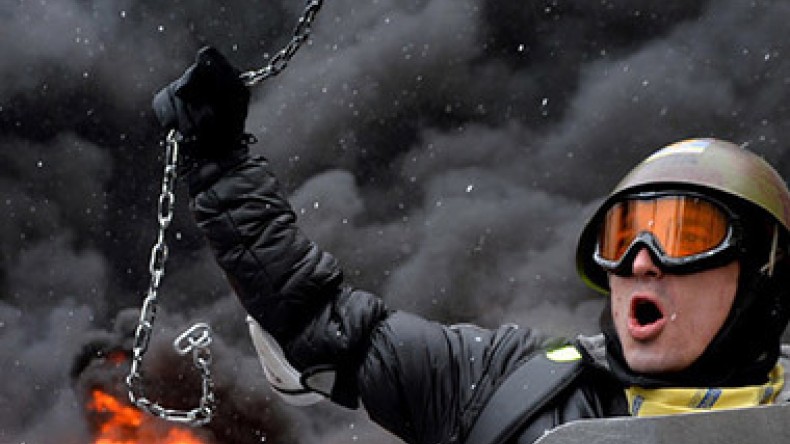
Euromaidan 1st birthday: How the Kiev coup grew
By Bryan MacDonald, RT
It’s been a year since thousands of peaceful protesters took part in the initial Euromaidan rallies in Kiev, hoping for a brighter future. Since that optimistic start, the state has been torn to shreds and now its very future is in doubt.
Ironically, Maidan was the cause, although it's probable that, eventually, Ukraine would have come to conflict by other means.
Kiev, November 21, 2013. Independence Square was a vivid sight. As one alighted from the Metro at Khreschatyk, passed the clock embedded in the greenery and took in the panorama, it was possible to imagine a strident, cosmopolitan capital. Taking in the upmarket underground shopping center and the high-class bars around the hub, Kiev exuded sophistication.
However, behind the veneer there was something rotten in Ukraine. Like a withered model, clearly everything was for show in the capital and behind the made-up facade, the truth was uglier.
Just a few blocks away from Maidan, it was evident that this was one of the poorest large cities in Europe. Pensioners sold fruit and cheese to top up their meager state payments and the stench of hopelessness was pervasive.
Kiev was not a pleasant place. Sure, it held attractions for those inclined towards edgy nightlife or the accumulation of fast, dirty money - but for normal visitors there was nothing appealing about Kiev. It was a dilapidated cousin to Prague or Budapest, circa 1995.
The police were aggressively corrupt, lurking on the square at night, waiting to catch an inebriated foreigner stumbling home late to one of the myriad hotels.
“Documents.. curfew violation… 20 euro.” A non-existent curfew from a police force that didn’t exist to protect, only to take and harass. A city that, unlike its bigger brother Moscow, had refused to reform. A city going nowhere.
Amid this horrendous atmosphere, President Viktor Yanukovich and his cronies were literally stealing the state’s few riches. Wealth was dug from the Donbas earth, moved to Kiev and then on to Switzerland or London, abetted by an opportunistic Western financial system.
The incumbent was not unusual in this regard. Every Ukrainian President since independence two decades ago had headed a kleptocracy. Nevertheless, Yanukovich had been promising Ukraine’s integration into Europe, playing Brussels off against traditional ally Moscow to procure more resources for his gang. Now matters had come to a head.
Yanukovich had, belatedly, realized that Ukraine couldn't afford to sign the slow-burning association deal with Brussels. Its industry was too backward to compete in Western markets and the prospect of losing favorable access to Russia’s strong economy spooked the elite.
Without exports to its former USSR partner, Kiev’s anemic economy would collapse. The money from Brussels just wasn't enough to even remotely bridge the gap.
On the other hand, Yanukovich had sold his people a European dream. Ordinary citizens, embittered by years of economic stagnation, and even decline, had pinned their hopes on open access to the EU. Especially the young - most of the smartest ones dreamt of leaving Ukraine for the more prosperous West.
The Association deal was the first step on that road. Now it was gone. In 1991, Ukraine’s slice of the total east European economy was 10.1 percent. By 2012 it had plummeted to 5.2 percent. In the same period, Russia’s share of the world economy had increased from 2.7 percent to 4.7 percent, despite the calamitous 1990s, when the huge nation had threatened to collapse.
Ukraine wasn’t even running to stand still: it was sprinting to avoid falling further behind. All the while, Ukrainians were watching their fraternal neighbors in Russia get richer and ditto those in adjoining Poland.
The protests began, but not as an organic reaction. No, they were better-organized and planned than a simple student movement could manage. On the first day, a Twitter account called ‘Euromaidan’ was ready and waiting to channel the anger into coordinated rage. Dozens of foreign specialists and returned Ukrainian emigrés also descended on central Kiev to launch the movement.
There was nothing instinctive about Euromaidan - the plans had been hatched long before. Somebody guessed that Yanukovich would kibosh the EU deal. They guessed right.
The day before, Prime Minister Nikolay Azarov had received word of the conditions of an IMF loan that the government had sought. The IMF insisted on budget cuts and a 40 percent increase in gas bills. Meanwhile, Russia had been gradually closing its markets to Ukrainian goods since August. The cabinet had done the math and realized that signing the EU treaty would collapse the economy. They demurred.
Within a few days, the Maidan was full of university students, attracted by a slick social media campaign. Given that Ukrainian students, generally, purchase rather than earn their diplomas, it's doubtful most could even comprehend what they were protesting for. Could they understand the difference between an association agreement and an offer of EU membership, which was another matter entirely?
On the November 24, three days after its inception, the first violent clashes took place between protesters and police. Meanwhile, the think-tank brigade was occupying the op-ed pages of the mainstream Western press with spurious arguments about what Ukraine could bring to Europe. My favorite is from early December’s New York Times: “Ukraine offers Europe economic growth and more.” The mendacity is striking, as by any metric the last thing a fiscally troubled union needed was 45 million, generally poor, Ukrainians to pay for. Despite this, the media campaign was in overdrive and reality was a faraway thought.
Soon, external politicians were swarming around Maidan. Only a fortnight after the first rally, Brussels’ Commissioner Catherine Ashton and US Deputy Secretary of State Victoria Nuland, were highly visible on the square. Nuland would later become notorious for her “fuck the EU” comment and for choosing Ukraine’s post-coup government. Predictably, John McCain made an appearance. His interest wasn't Ukraine, it was in giving one in the eye to Vladimir Putin, his longtime bête noire.
The same day that the two Anglophone officials arrived, December 11, Azarov pleaded with the EU and IMF for €20 billion to cover the trade losses involved in accepting the EU deal. He was offered a mere €610 million, around 1/40th of what was needed. Russia immediately stepped in with $15 billion, accompanied by subsidized gas prices. Additionally, Brussels attached huge, reform based, conditions to its meager sum - the Kremlin did not.
Already Ukraine was divided, polls showed that around half the country supported Euromaidan and the other half didn’t. Predictably, as anyone who understood the fractured state of the nation could have guessed, there was a huge regional variance in these figures.
In the largely Catholic, mostly Ukrainian speaking west, the vast majority demanded a European path; in the Russophone, industrial east, a similar amount favored the Moscow deal. It’s worth noting that the east generated the bulk of Ukraine’s wealth and had a lot to lose from de-industrialization. The agrarian and poor west had little to risk. “When you got nothing, you got nothing to lose,” as Bob Dylan put it.
On November 30, Yanukovich first used Berkut riot police to attempt a dispersal of Maidan’s protestors. The following day, riots began - with around 80 injured, including some journalists. Eleven days later, the government tried a night assault and a week later violence erupted on Grushevskogo Street.
After a lull around New Year, when a negotiated settlement appeared possible, events escalated in February when a violent coup occurred, leaving at least 113 people dead. On February 18, around 20,000 protestors marched on Kiev’s parliament. Shots were fired by both sides and some regions, notably Lvov, declared themselves independent of central government.
The following day, a de facto state of emergency was implemented in Ukraine. At the same time, the neo-fascist Right Sector movement indicated its intention to escalate the situation.
Twenty-four hours later, dozens of people were murdered by snipers. Over nine months on, it’s still unclear who was responsible. Those in the new Ukrainian regime, predictably, blame their predecessors; German television and Reuters have indicated that parties affiliated to Euromaidan may have been responsible in a provocation. Recently, a former Berkut commander, Dymtro Sadovnyk, was prosecuted for shooting protestors. As Reuters revealed, there was a significant problem with the evidence: Sadovnyk has only one hand and can’t physically fire a rifle.
Meanwhile, three EU foreign ministers went to Kiev to try to negotiate a peace accord, Germany’s Frank-Walter Steinmeier, France’s Laurent Fabius and Poland’s Radoslaw Sikorski. Yanukovich agreed to form a national unity government within 10 days and hold early elections. The Euromaidan protestors had got what they’d asked for - the hated president was on the way out.
Nevertheless, extremist elements such as Right Sector rejected the deal. State forces stood down and Yanukovich was forced to flee. The hardcore nationalists had ignored the peace agreement and the US capitalized by installing a puppet government, exactly per Nuland’s intercepted phone call.
There had been a coup in Kiev. Despite their agreement with Yanukovich, the EU leaders, amazingly, also backed the militant regime. Ukraine would never be the same again.
Newsfeed
Videos





